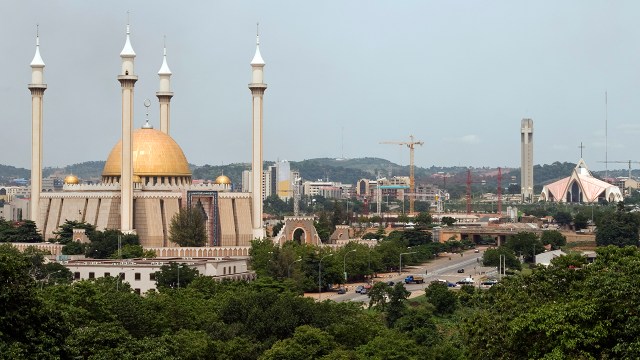
U.S. President Donald Trump recently called attention to religious violence in Nigeria and raised the possibility of invading the country to protect its Christian minority. The Nigerian government has disputed Trump’s claims that Christians there are being religiously persecuted.
Following the president’s comments, here are five facts about religion in Africa’s most populous country, based on previous Pew Research Center studies.
As of 2020, Muslims made up a majority of Nigeria’s total population (56.1%), while Christians made up 43.4%, according to our estimates. We estimate that all other groups made up 0.6% of the national population.
| Group | Share of population |
|---|---|
| Muslims | 56.1 |
| All other groups | 0.6 |
| Christians | 43.4 |
While most people in Nigeria identify as either Muslim or Christian, African traditional religions also shape many Nigerians’ beliefs. For example, about seven-in-ten adults believe that spells, curses or other magic can influence people’s lives.
Nigeria’s religious composition has been a subject of debate. The last census effort to measure religion took place in 1973, but results were not published due to allegations of data falsification. The most recent publicly available data is from 1963. Rumors that the country’s (now postponed) 2023 census might measure religion led the census agency to clarify that it does not plan to include such a question for sensitivity reasons.
A recent academic study analyzing surveys of adults found that Christians outnumbered Muslims in recent decades. However, Nigeria’s population is quite young. Since half of its people are under 18, any analysis that focuses only on adults may miss half the story.
To estimate the religious composition of Nigeria’s total population, including children, Pew Research Center uses data from the country’s Demographic and Health Survey (DHS). Surveys from the DHS project gather demographic information from all household members, including children and adults, in thousands of randomly sampled households throughout the country. Religion is measured only among household members of reproductive age.
Using all available information about the religion of household members, we carefully estimate the likely religious identity of other household members and members of households that do not include people of reproductive age.
| Year | Muslims | Christians | All other groups |
|---|---|---|---|
| 2010 | 90890000 | 73980000 | 1770000 |
| 2020 | 119980000 | 92770000 | 1250000 |
The Muslim and Christian populations in Nigeria both have been growing rapidly. From 2010 to 2020, Nigeria’s Muslim population rose 32% to 120 million people and its Christian population grew by 25% to 93 million.
Nigeria has the world’s fifth-largest Muslim population and its sixth-largest Christian population. It is the only country that ranks among both the 10 largest Muslim populations and the 10 largest Christian populations.
Nigeria is one of seven countries with “very high” levels of social hostilities involving religion as of 2022, according to the Center’s index. Both Muslims and Christians have been attacked, kidnapped and killed by armed gangs. Boko Haram and the Islamic State West Africa Province have burned churches and mosques.
In the middle belt region separating largely Muslim northern Nigeria from heavily Christian southern Nigeria, tension between predominantly Christian farmers and Muslim herders has produced violent conflict over land and resources.
Other countries with “very high” social hostilities involving religion are Afghanistan, Egypt, India, Iraq, Pakistan and Syria.
Nigeria scores in the Center’s “high” category for government restrictions on religion. The government has used sharia penal codes to prosecute Muslims accused of LGBTQI+ activity and has used blasphemy laws to punish Muslims, Christians and humanists accused of insulting Islam. Sharia courts are present in 12 northern states and the Federal Capital Territory.
